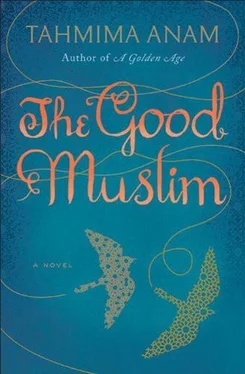Joy had little affection for the city, but on the day he was released from jail he fell unexpectedly in love with it. That morning, the young subedar unlocked his cell, turned silently away and joined the retreating army. Joy turned to his cellmates, Raheem and Sultan and the old Abbass, helping them to their feet. They hesitated, the other three, at the threshold, not believing they weren’t being tricked into the firing squad or the leg room. But Joy had recognised the loud passage of Indian fighter jets, had known they were on the brink of victory.
In his three months of captivity Joy had refused to speak. Not a word of assent, or protest, or denial, no shake of the head or movement of the hand. At the guerrilla camp in Sonamura they had been told something — he couldn’t remember — about being captured, but, like the rest of their training, it was perfunctory, told casually as though it would never happen. The officers had taken this tone with all matters of disaster, parcelling out instructions with dry voices and short sentences, as though no one would ever get shot in the middle of an operation and need to be dragged by his collar and propped up against a tree so that his brother could watch him die, catch his final words in the spoonful of his ear, lock them in his heart until it was safe to tell their mother.
There were twenty-three of them, captured in November on a hot, rain-thirsty morning. And he watched as they were taken, one by one, into the room next door, the leg room. And encouraged to speak. And as soon as they spoke — said I am a mukti, yes, I fought against the army, yes, I betrayed the country, yes, yes, I am a traitor, yes, I believe in Bangladesh, yes, I was seduced by Sheikh Mujib, Sheikh Mujib is a pig, I am a pig, yes, yes, yes — whatever was being done to them would stop. And the rest of them, bound together by their equal hatred of the piss-pot in the corner of the cell, the foot beatings, the word ‘bastard’ attached to the mispronunciation of their name, eased into a quiet night, waking, the next morning, to the call to prayer followed by the snap of bullets.
That the soldiers liked to do their shooting at the hinge of day was another of their incomprehensible habits, like the taking of meat in the morning, which they did daily without fail.
Silence, and then the shot. This was all the schooling Joy needed. So when they took him out into the yard, he did not scream or curse or spit or rage. He pretended he couldn’t make any sounds, and soon it became too difficult to utter words at night and forget them in the day, so he gave up speaking altogether. He learned the gestures of animals — the fingers in the mouth, hand in front of his face, the wave to indicate friendship. With his tongue trapped, his hands were freed — to hold the head of the boy who had run away to fight, the soldier with the torn shoulder, the one who feared the current above all other things and, later, his thing, to ease the pain. Beard growing, hands healing, tongue-tied, Joy passed his three months in the belly of a cell, determined he would survive to see what came after.
The soldiers marked time by the sounds they routinely heard. The call to prayer. The splashing of water while performing the Wazu. The unrolling of prayer mats. The screams of the birds, arguing throughout their morning rituals. The prisoner dragged, heels collapsing, in front of the firing squad. His final plea for mercy.
But this prisoner made no sound. Not at the beating of his soles or the putting out of cigarettes on his back or the electrocution of his mouth. They rode him harder than all the others, charged with the suspicion, the hope, that his silence was loaded, that he might yield something special. He must know something, and he must have been trained to keep it, this secret. It was just a matter of cracking him. So they waited, taking him every day to the leg room, the upside-down room, the chair. He didn’t cry, he didn’t speak.
Finally, it was too much for his captors to bear. On a particularly slow day, they took their revenge. The new prisoners they were expecting had failed to arrive, and it was only the silent one and the old man who had dried up a long time ago, not worth the price of a bullet. The birds were winning. Singing, gurgling, cackling. Aftab, the youngest in the unit, fired a shot into the tamarind tree, sending the birds flapping, raising their voices, and now they moved to the windowsills of the barracks and picked at the remnants of food tossed carelessly through the bars, the dried-up bits of bread. The rest of them cursed him for shooting into the tree, typical Sindhi behaviour, they said, probably shits softer than the rest of us.
They dragged Joy out to the compound. Aftab nudged him with the back of his rifle. ‘Make the birds stop singing,’ he said. ‘Bengali birds, they’ll listen to you.’
Joy stood silent as the flap of birds continued around him, like sheets in the wind.
‘Do it.’ The slap of the rifle, the small rectangle of pain. ‘Now,’ he said, ‘make those sisterfucking birds shut the fucking hell up or I will shove a bullet up your ass, I swear it.’
Joy raised himself to his knees and pointed at the tree. Nothing happened for a few moments: the birds continued to crowd the windowsill, picking and flirting and flapping. Then a small one separated from the others and sailed up, away from the compound, circling the perimeter of the building. The soldiers lifted their eyes to it as it turned and came towards them, landing quietly on Joy’s outstretched finger. With his other hand, Joy stroked the bird as it moved up on to his arm, settling on the crook of his elbow. That was the last day he was whole; later they took his finger as payment, so the birds would have one less place to perch, one less reason to sing.
Freed in February, Joy fell in love with the city. Dhaka was the first thing he saw when he opened his eyes, and its air was the first into which he spoke; it was the only place he wanted to be. He walked home, making his way out of the army cantonment and through the live streets, embraced by strangers who cried out at the sight of his scarred arms, his absent finger.
It wasn’t until he got home that he learned the war had taken his father too. He walked into the house and saw his mother in a white sari and he knew. She sent him away, then, sent him as far from Dhaka as she possibly could, mortgaging their house and pawning her wedding jewellery. And he had grasped at the chance and fled without looking back, without regret or sentiment.
He never thought about why he had been caught that night. Never minded it. On that November morning when it refused to rain, he had run free for six hours, scratched by close, thin-limbed trees, chased by the sound of dogs until his breath gave out — and in the few seconds it took them to catch up with him he had enough time to contemplate taking the gun to himself but not enough to balance the rifle against his head. So, as the day cracked open, hot and tired, and he walked back into the city with his arms and legs shackled, he thanked the soldiers for their speed, because he wasn’t ready to die, not on that day, not in the very year he had watched the blood ribboning out of his brother.
Headmaster Headmaster Headmaster
Headmaster Headmaster Headmaster Huzoor Huzoor Huzoor. Your whip is a snake. Why you bracelet my wrist? Why keno por que? I speak all the tongues but Arabic. You take revenge on my Arabic. Revenge on the palm of my hand. Zaid was an orphan adopted by the Prophet. I am an orphan. The Prophet was an orphan. Peace and blessings be upon the orphan that was the Prophet. When my mother died, the Kazi said, You are now an orphan . My father took me across the river and he told the Huzoor, he is in your hands now, and Allah’s. The Huzoor takes my hand. He puts my hand on his heat. His whip is a snake. His snake is a whip. Hands on the heat. In the Huzoor’s hand. In Allah’s hands. Because my hands were wandering. Stealing. Coins and notes. Why you hold my hands behind my back? Keno why pourquoi? I always ask them to teach me three things. Hello and Goodbye, peace on earth, and why. They don’t like to teach why. I get it out of them. Why why why. Why did you put me in the Huzoor’s hands? Why the Huzoor’s hand? His hand on my hand. My hand in his hand. It is always like this for the new ones, one of the boys tells me. He is happy I am here, no more Huzoor for him. You are too pretty, he says. Foreign eyes. I am the Prophet’s orphan. The Huzoor likes light eyes. The Huzoor’s hand in my hand. All the boys laughing. The doors are always locked. The Huzoor carries the key around his neck. The toilet is outside, it is a hole dug into the ground. Deep. Flows into the river. I can hold my breath that long.
Читать дальше












